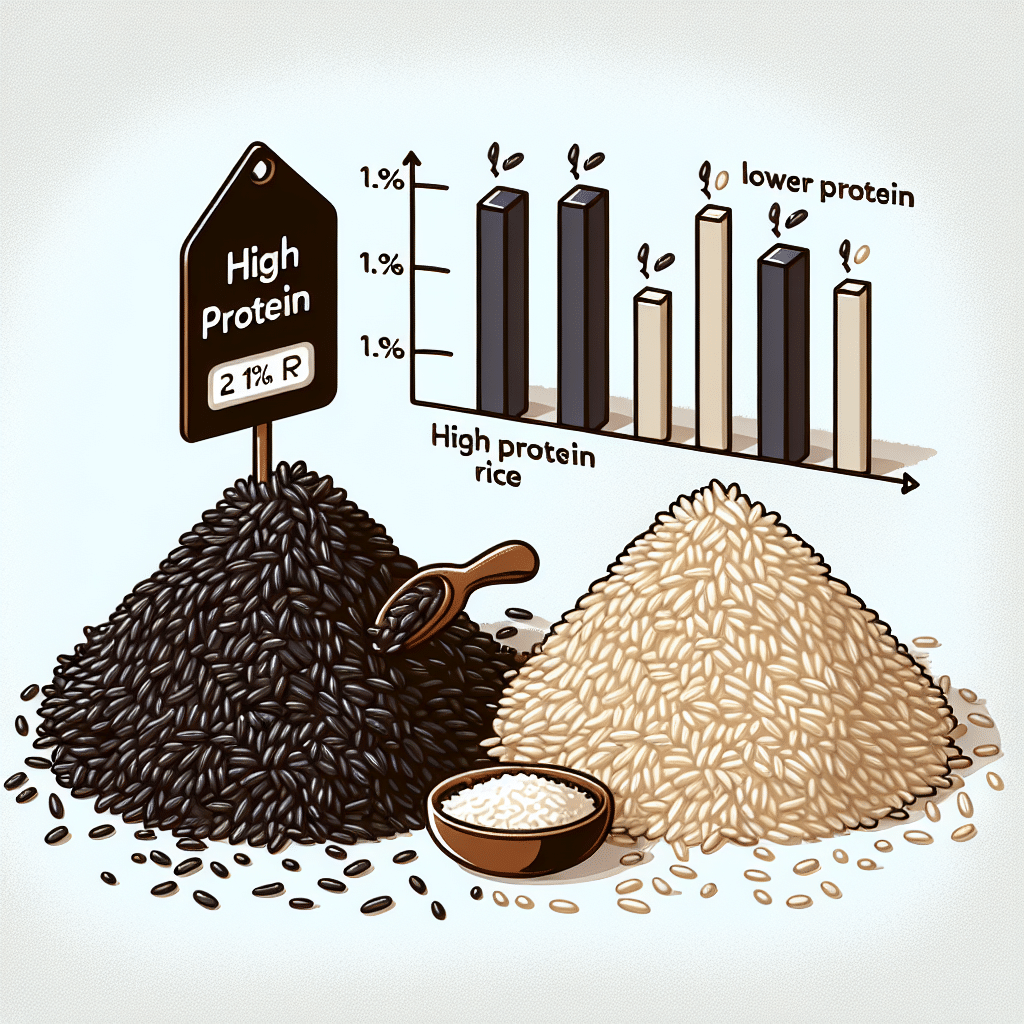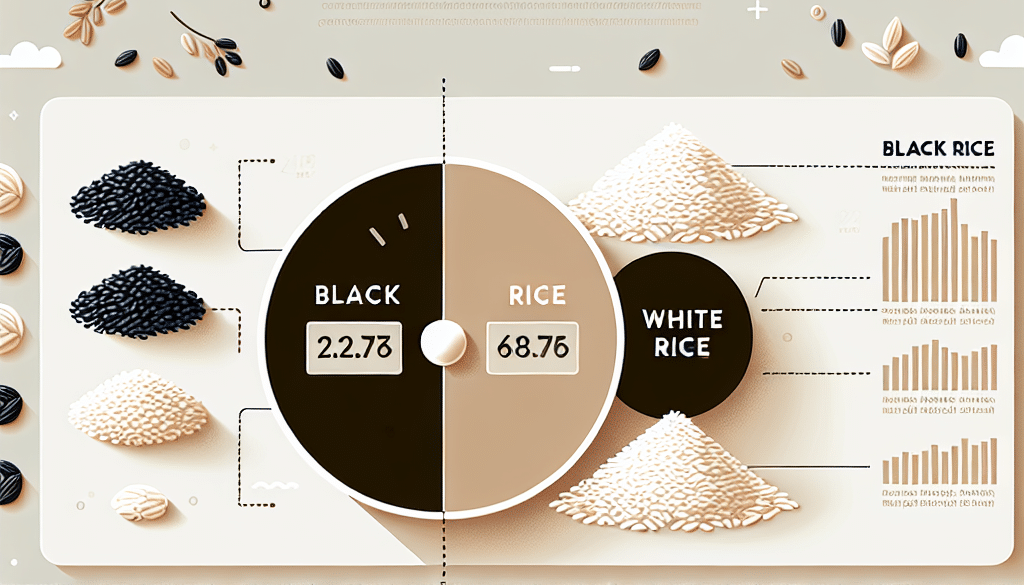Does black rice have more protein than white rice?
-
Table of Contents
- Black Rice vs. White Rice: A Protein Comparison
- Nutritional Profiles: Black Rice and White Rice
- Protein Content: Black Rice vs. White Rice
- Quality of Protein: Amino Acid Profiles
- Health Benefits Beyond Protein
- Case Studies and Research
- Incorporating Black Rice into Your Diet
- Conclusion: The Protein Advantage of Black Rice
- Discover ETprotein’s High-Quality Protein Products
Black Rice vs. White Rice: A Protein Comparison

When it comes to choosing rice, the options are plentiful. Among the various types, black rice and white rice stand out for their distinct characteristics. One of the key nutritional aspects consumers often consider is the protein content. This article delves into whether black rice has more protein than white rice, providing a comprehensive analysis for health-conscious individuals.
Nutritional Profiles: Black Rice and White Rice
Before comparing the protein content, it’s essential to understand the overall nutritional profiles of black rice and white rice. Black rice, also known as ‘forbidden rice,’ is a whole grain with a deep purple hue, which is a result of its high anthocyanin content. White rice, on the other hand, is a refined grain that has had its husk, bran, and germ removed, resulting in a loss of certain nutrients.
- Black Rice: Rich in antioxidants, dietary fiber, and contains a higher amount of vitamins and minerals compared to white rice.
- White Rice: Generally lower in fiber and nutrients due to the refining process, but often enriched with vitamins and minerals to compensate for losses.
Protein Content: Black Rice vs. White Rice
Protein is a crucial macronutrient necessary for building and repairing tissues, making enzymes and hormones, and supporting overall health. The protein content in rice can vary based on the type and how it’s processed.
- Black Rice: Typically contains around 8-9 grams of protein per cooked cup (195 grams).
- White Rice: Contains about 4-5 grams of protein per cooked cup (158 grams).
From these figures, it’s evident that black rice does indeed have a higher protein content compared to white rice. However, it’s important to note that the serving sizes are different due to the difference in density and water absorption during cooking.
Quality of Protein: Amino Acid Profiles
While quantity is important, the quality of protein is determined by its amino acid profile. Proteins are made up of amino acids, some of which are essential and must be obtained through diet.
- Black Rice: Contains all nine essential amino acids, making it a complete protein source, although some amino acids may be present in lower amounts.
- White Rice: Also contains all essential amino acids but is particularly low in lysine, making it a less complete protein source.
Both black and white rice are not as high in lysine as legumes, but when combined with other protein sources, they can contribute to a well-rounded diet.
Health Benefits Beyond Protein
Aside from protein, black rice offers additional health benefits that white rice lacks due to its higher nutrient content.
- Antioxidant Power: The anthocyanins in black rice provide potent antioxidant properties, which can help fight inflammation and reduce the risk of chronic diseases.
- Dietary Fiber: Black rice is higher in fiber, which aids in digestion, helps control blood sugar levels, and may contribute to weight management.
- Mineral Rich: It contains more iron, magnesium, and zinc compared to white rice, contributing to better overall health.
Case Studies and Research
Several studies have highlighted the nutritional superiority of black rice over white rice. For instance, a study published in the ‘Journal of Agricultural and Food Chemistry’ found that black rice has a higher nutritional value, including protein content, compared to white rice. Another study in the ‘International Journal of Food Sciences and Nutrition’ echoed these findings, suggesting that the consumption of black rice can contribute to a more nutritious diet.
Incorporating Black Rice into Your Diet
Given its higher protein content and nutritional benefits, incorporating black rice into your diet can be a smart choice. Here are some ideas:
- Use black rice as a base for stir-fries or bowls.
- Mix it with white rice to create a textured and nutritious side dish.
- Make black rice pudding as a healthy dessert option.
- Include it in salads for added color and nutrients.
Conclusion: The Protein Advantage of Black Rice
In conclusion, black rice does have more protein than white rice, along with a host of other nutritional benefits. Its higher protein content, combined with a complete amino acid profile and additional health perks, makes it an excellent choice for those looking to enhance their diet. While white rice remains a staple in many cultures, black rice offers a nutritious alternative that can contribute to a balanced and healthful eating pattern.
Discover ETprotein’s High-Quality Protein Products
If you’re looking to supplement your diet with high-quality protein products, consider ETprotein’s offerings. They provide a range of organic and vegan protein options, including organic rice protein, which can complement your intake of natural protein sources like black rice.
About ETprotein:
ETprotein, a reputable protein and L-(+)-Ergothioneine (EGT) Chinese factory manufacturer and supplier, is renowned for producing, stocking, exporting, and delivering the highest quality organic bulk vegan proteins and L-(+)-Ergothioneine. They include Organic rice protein, clear rice protein, pea protein, clear pea protein, watermelon seed protein, pumpkin seed protein, sunflower seed protein, mung bean protein, peanut protein, and L-(+)-Ergothioneine EGT Pharmaceutical grade, L-(+)-Ergothioneine EGT food grade, L-(+)-Ergothioneine EGT cosmetic grade, L-(+)-Ergothioneine EGT reference grade and L-(+)-Ergothioneine EGT standard. Their offerings, characterized by a neutral taste, non-GMO, allergen-free attributes, with L-(+)-Ergothioneine purity over 98%, 99%, cater to a diverse range of industries. They serve nutraceutical, pharmaceutical, cosmeceutical, veterinary, as well as food and beverage finished product distributors, traders, and manufacturers across Europe, USA, Canada, Australia, Thailand, Japan, Korea, Brazil, and Chile, among others.
ETprotein specialization includes exporting and delivering tailor-made protein powder and finished nutritional supplements. Their extensive product range covers sectors like Food and Beverage, Sports Nutrition, Weight Management, Dietary Supplements, Health and Wellness Products, and Infant Formula, ensuring comprehensive solutions to meet all your protein needs.
As a trusted company by leading global food and beverage brands and Fortune 500 companies, ETprotein reinforces China’s reputation in the global arena. For more information or to sample their products, please contact them and email sales(at)ETprotein.com today.














